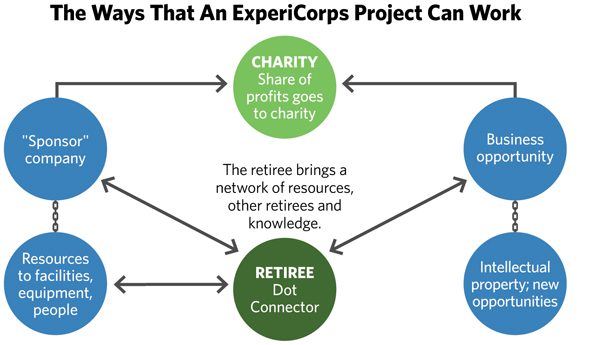He also had extensive experience in commercializing other people’s creations. He had spent years developing processes, networks and resources and had tapped some world class experience in helping others commercialize their ideas.
He decided to call his patent lawyer and ask if any of his clients could use the same kind of help. The attorney thought it was a wonderful idea. He has many clients who get patents and have absolutely no idea how to move them forward.
Intellectual property typically requires not only a sponsoring company but also a little technical help in cleaning up some of the rough edges—which is likely the primary reason inventors have trouble. So having access to an executive and a professional network of engineers, programmers, etc.—people who could help with the process—would be priceless to the inventor.

That’s how the business model for ExperiCorps evolved and became much easier to embrace and understand. The intent is still to pursue business opportunities, but the mechanism we now use is the commercialization of intellectual property. That allows us to take advantage of all sorts of different skills and talents. What do engineers, programmers, technical execs, etc. like to do better than jump on a new idea?
We subsequently talked to other lawyers whose inventor clients had the same problem. Just think of all the business opportunities that might be generated with a little help. We figured that if ExperiCorps could put together a small team to assist frustrated inventors, why wouldn’t those inventors share a percentage of the licensing proceeds—particularly if it’s for charity?
So now we have four winners: the charities; the business sponsor; the inventor; and the retirees, who have something to work on that can provide extreme personal reward. That is the ideal scenario!
Our project also helps charities transform their funding practices. Many of the inventions will produce licensing income, which can offer the charities a constant income stream (meaning they’ll have to do less soliciting).
Since there are no critical deadlines, this type of work should suit retirees. The effort generally involves organizing discussions and meetings with key people. It doesn’t have to take much time out of any one day and is easy to schedule. Retirees can bring their experience back to productivity with very modest time commitments … and see their efforts help those in need.
Those looking for some extra income can also benefit from the ExperiCorps model, since they could take half of the proceeds in kind as pay. A minimum of 50% to the charity from the contributing retiree is required, however. In our initial projects, the contributing retirees donated 100% to the charity, but we also recognize there will be those who could do with the extra income—and the professional assistance available from ExperiCorps can help generate that.
Bear in mind that this idea is not limited to software, and one could capitalize on any type of intellectual capital and experience. It’s simply the commercialization of the property that needs to be figured out and then a connection needs to be made with a firm that could use it. Things accelerate from there.
There are enough retirees out there who would jump at the chance to make a difference in the world around them while putting their brain potential to use.
We want to know what you think. Got ideas? Drop us a line at [email protected].
Mitch Anthony is the creator of Life-Centered Planning, the author of 12 books for advisors, and the co-founder of ROLadvisor.com and LifeCentered Planners.com.








